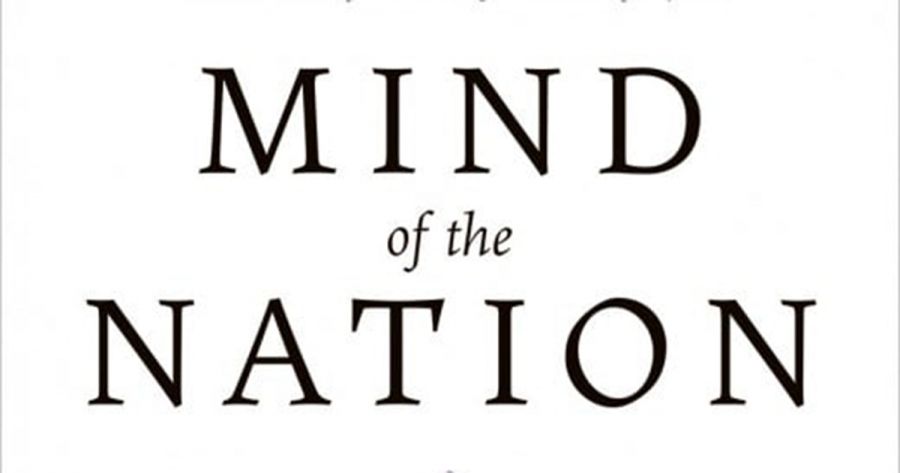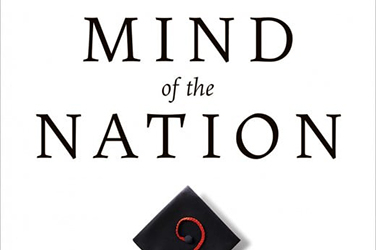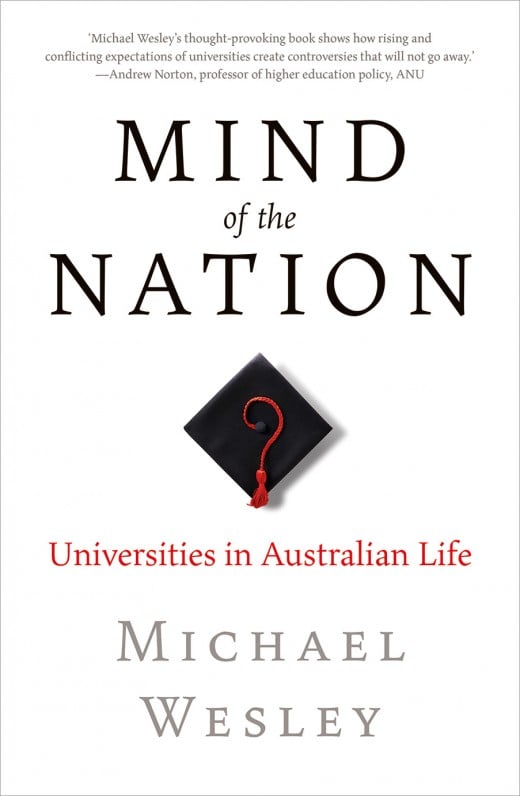
- Free Article: No
- Contents Category: Education
- Review Article: Yes
- Article Title: Quad strain
- Article Subtitle: Australia’s ambivalence towards our universities
- Online Only: No
- Custom Highlight Text:
Michael Wesley is an academic and deputy vice-chancellor at the University of Melbourne. During the Covid lockdowns, while the rest of us were baking sourdough, he pulled together several related strands of thought about universities and Australia’s complicated relationship with them. Mind of the Nation, the result, offers a survey of where we are and how we arrived here, looked at from a number of different but intersecting angles.
- Featured Image (400px * 250px):

- Alt Tag (Featured Image): John Byron reviews 'Mind of the Nation: Universities in Australian life' by Michael Wesley
- Book 1 Title: Mind of the Nation
- Book 1 Subtitle: Universities in Australian life
- Book 1 Biblio: La Trobe University Press, $34.99 pb, 256 pp
- Book 1 Cover Small (400 x 600):

- Book 1 Cover (800 x 1200):

Wesley makes a convincing case for his paradoxes, although at times he elides the distinction between public opinion and political behaviour in order to pull it off. By and large, they ring pretty true. Australians want their universities to be high in quality but inexpensive; to conduct outstanding research and send the bill abroad, while keeping onshore international student numbers in check; to pursue new fundamental knowledge yet commercialise vigorously; to preserve ancient tradition while being practical; to achieve and if possible transcend excellence while eschewing élitism; to be the best in the world while teaching all subjects not too far from home; to defend academic freedom absolutely while avoiding upsetting anyone; to naturally diversify within a uniform funding model; to be the repository of all knowledge but be humble about it.
Refreshingly, Wesley does not lambaste the public or the political class for holding to these paradoxes: he skips over the apportionment of blame (more or less) to the more pragmatic and pressing issue of who is responsible for straightening it all out. Spoiler alert: it’s up to the universities.
One challenge with Mind of the Nation is that there is enough substance in each one of these chapters for a book in its own right. Wesley has covered an impressive terrain within his word limit, but this has obliged him to keep the arguments brief, brisk, and a little superficial. The result, for the policy professional, is a lot of nuances elided and contestable claims taken as read; for the general reader, it is a lot of dates, data, and dense reasoning. The campaign around academic freedom and freedom of speech on campus, for instance, certainly warrants an in-depth, book-length exploration, but that dishonest attack on universities conducted under the cover of concern for standards is a story that Wesley can really only outline here.
Having said that, the chapter concerning that particular episode of the culture wars – ‘Integrity’ – is the most satisfying passage in the book, because Wesley ventures out of his shell, offering a firm opinion and elaborating a set of standards against which he believes the matter should be judged. In the other chapters he plays a more cautious hand, laying out the history and illustrating his observations, but stopping just short of telling us what he really thinks.
Another frustration is a function less of Wesley’s level of candour than of the nature of the problem he describes. After spelling out his belief that there is a set of paradoxical attitudes towards higher education generally and universities specifically, he leaves us with the final exhortation that universities need to do more, without much in the way of specific suggestions, apart from an impassioned call to unite more effectively. One suspects that’s less to do with Wesley pulling his punches than because this is where the next conversation needs to begin.
In that conception, Mind of the Nation is really a conversation starter for university staff, politicians, bureaucrats, and anyone else who can see that the public benefit – or the national interest, if you prefer – is being held back because we as a society have not yet worked out how to get the best out of our universities, and because universities have still not worked out how best to convey to the public and its servants in parliament the contribution universities are already making and can make in the future.
For all the book’s strengths it has several weaknesses, such as the curious choices Wesley makes to support his arguments. He relies far too much on letters to the editors of The Australian and The Age, for one thing. The points that Wesley is illustrating with these inclusions may well be sound, but the collected umbrage of ‘Outraged from Wahroonga’ and his fellow correspondents is not evidence: it is anecdote.
The credibility of some of Wesley’s arguments is also weakened by the partiality and inexpertise of some of the witnesses he calls. He gives airtime to a number of blowhard partisan culture warriors whose sustained firsthand exposure to universities dates back to their own undergraduate days, and little to none to others whose daily toil is concerned directly with the conditions of university life. The Institute of Public Affairs and the Centre for Independent Studies are cited generously, for example; the National Union of Students and the National Tertiary Education Union, not at all.
There are a few other conspicuous omissions. A medley of post-Dawkins higher education ministers make no appearance – notably Julie Bishop, Simon Birmingham, Chris Evans, Kim Carr, Craig Emerson, and Jason Clare – despite their radically different but undoubtedly significant contributions to the policy debates and developments considered here. Nor, in the course of a long discussion of the impact of research-based rankings on universities’ public standing and their own behaviour, does our local Australian research assessment rate a mention.
Overall, though, I find this survey both accomplished and reasonably persuasive. It is well written, robustly argued, and intelligently organised. It is a sound contribution to helping us understand the situation Australian universities find themselves in, and a platform for further thinking about how to address it. Higher education policy specialists will certainly appreciate it, as well as university workers with an interest in the history, fortunes and travails of their sector. The general reader should find it accessible and informative, too – if only she can be convinced to pick it up.
The reach of Mind of the Nation may depend to some degree on defying the very paradox it describes. The publishers must hope it is not adjudged too ‘academic’, or too concerned with an area of public policy in which the broader population – so goes the book’s own argument – can barely muster a passing interest. I hope that’s not the case, and that the book finds the general audience with whom universities must make alliance. If, through healthy sales, Mind of the Nation reveals the public ambivalence towards all things universitas to be less widespread than the analysis therein holds, I don’t suppose anyone will quibble about that fresh paradox.


Comments powered by CComment